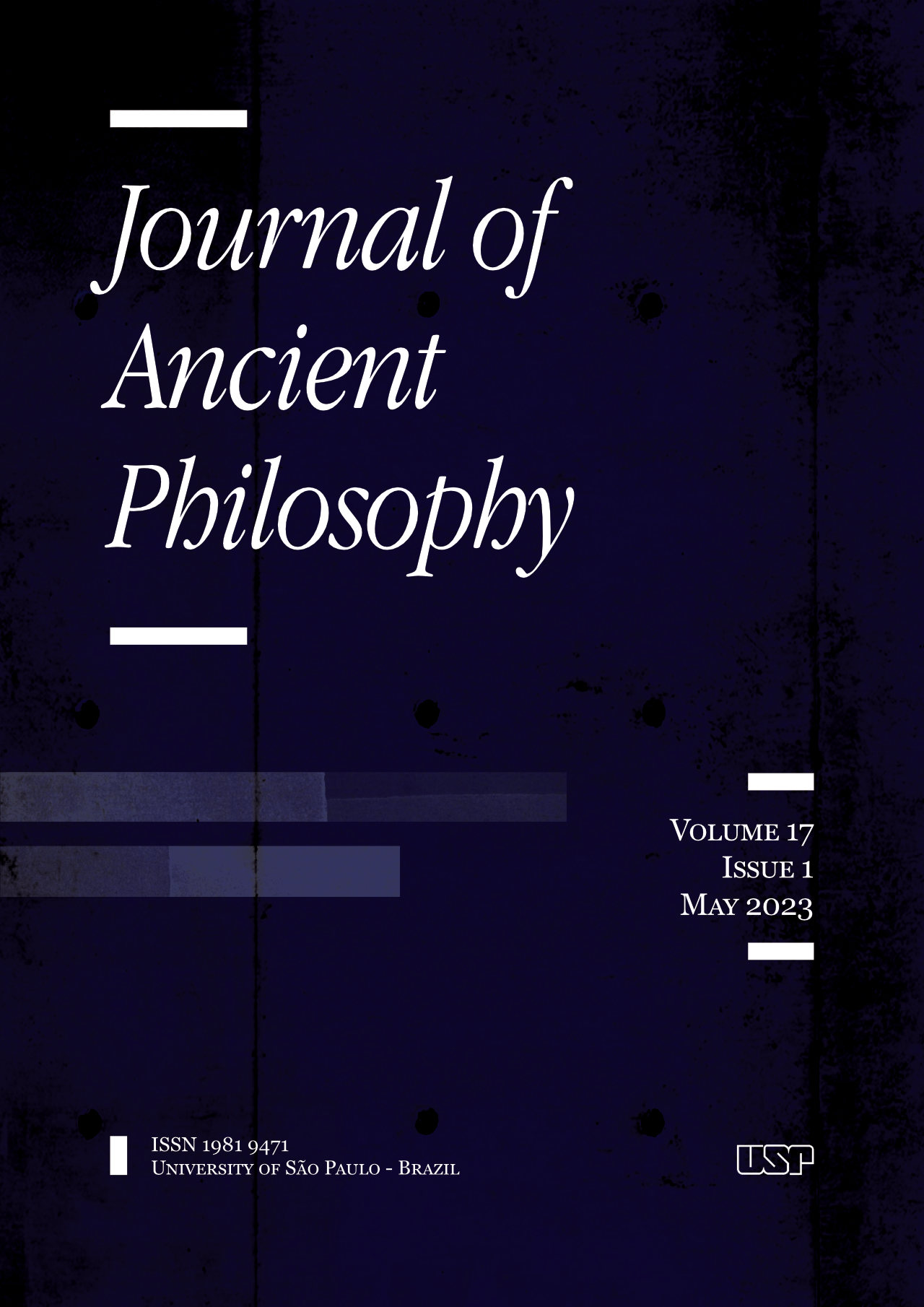How Does Aristotle Understand the Paradox of the Meno?
DOI:
https://doi.org/10.11606/issn.1981-9471.v17i1p80-95Palavras-chave:
Aristotle, Meno, Posterior Analytics, Prior Analytics, Universal Knowledge, Knowledge of ParticularsResumo
I focus on the distinction between universal and particular knowledge or knowledge simpliciter in APr 2.21 and APo 1.1 as Aristotle’s explicit response to the paradox of the Meno. I attempt to derive a picture of Aristotle’s understanding of the philosophical problem underlying that paradox by asking what that problem would have to be in order for this distinction to make sense as a response to it. I consider two ways of taking the distinction, and argue that both point towards a problem about deriving knowledge of particulars from knowledge of universals as the fundamental problem underlying Aristotle’s understanding of the Meno paradox.
Downloads
Referências
Barnes J. (Ed). The Complete Works of Aristotle, Princeton: Princeton University Press, 1984.
Barnes J. Posterior Analytics, Oxford: Clarendon Press, 1993.
Bronstein D. Aristotle on Knowledge and Learning, Oxford: Oxford University Press, 2016.
Charles D. “The Paradox in the Meno and Aristotle’s Attempts to Solve it”, in D. Charles (ed.), Definition in Greek Philosophy, Oxford: OUP, 2010, pp. 115-150.
Ferejohn M. “Meno’s Paradox and De Re Knowledge in Aristotle’s Theory of Demonstration”, History of Philosophy Quarterly, 5, 1988, pp. 99-117.
Fine G. The Possibility of Inquiry: Meno’s Paradox from Socrates to Sextus, Oxford: OUP, 2014.
Gifford, M. “Lexical Anomolies in the Introduction to the Posterior Analytics Part I”, Oxford Studies in Ancient Philosophy, Vol. 19, 2000, pp. 163-223.
Gifford M. “Aristotle on Platonic Recollection and the Paradox of Knowing Universals: Prior Analytics B.21 67a8-30”, Phronesis, Vol. 44, 1999, pp. 1-29.
Jenkinson, A. J. (trans). Prior Analytics in Barnes J., The Complete Works of Aristotle, Princeton: Princeton University Press, 1984.
LaBarge S. “Aristotle on ‘Simultaneous Learning’ in Posterior Analytics 1.1 and Prior Analytics 2.21”, Oxford Studies in Ancient Philosophy, Vol. 27, 2004, pp. 177-215.
Morison, B. “An Aristotelian Distinction between Two Types of Knowledge”, Proceedings of the Boston Area Colloquium in Ancient Philosophy, Vol. 27, 2012, pp. 29– 57.
Ross, W. D. Aristotle’s Prior and Posterior Analytics. Oxford: Oxford University Press, 1949.
Downloads
Publicado
Edição
Seção
Licença
Direitos autorais (c) 2023 Nathan Elvidge

Este trabalho está licenciado sob uma licença Creative Commons Attribution-NonCommercial 4.0 International License.
Autores que publicam nesta revista concordam com os seguintes termos:- Autores mantém os direitos autorais e concedem à revista o direito de primeira publicação, com o trabalho simultaneamente licenciado sob a Licença Creative Commons Attribution (CC 4.0) que permite o compartilhamento do trabalho com reconhecimento da autoria e publicação inicial nesta revista.
- Autores têm autorização para assumir contratos adicionais separadamente, para distribuição não-exclusiva da versão do trabalho publicada nesta revista (ex.: publicar em repositório institucional ou como capítulo de livro), com reconhecimento de autoria e publicação inicial nesta revista.
- Autores têm permissão e são estimulados a publicar e distribuir seu trabalho online (ex.: em repositórios institucionais ou na sua página pessoal) a qualquer ponto antes ou durante o processo editorial, já que isso pode gerar alterações produtivas, bem como aumentar o impacto e a citação do trabalho publicado (Veja O Efeito do Acesso Livre).


